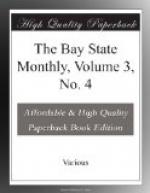The Commissioners, strange to say, were either too stupid or too timid to perceive the advantage of this concession. Fortunately for the country, their indifference lost to Rebellion its only possible chance of peaceful success.
The Commissioners evidently believed that the President was within the control of the cabinet cabal, for they made an angry complaint against Anderson, and imperiously demanded “explanations.” For two days the President wavered. An outside complication tended to open his eyes. On the 31st of December Floyd resigned the portfolio of war; and, on the same day, the President sent to the Commissioners a definite answer that, “whatever might have been his first inclination, the Governor of South Carolina had, since Anderson’s movement, forcibly seized Fort Moultrie, Castle Pinckney, and the Charleston arsenal, custom-house, and post-office, and covered them with the palmetto flag; that under such circumstances he could not, and would not, withdraw the Federal troops from Sumter.” The angry Commissioners returned home, leaving behind them an insolent rejoinder, charging the President “with tacit consent to the scheme of peaceable secession!”
IV.
The crisis of December 31st changed the attitude of the Government toward Rebellion. Joseph Holt, of Kentucky, was appointed Secretary of War. General Scott was placed in military control.
An effort was at once made to reinforce Sumter. On the 5th of January notice was sent by Assistant Adjutant-General Thomas, from New York, to Major Anderson that a swift steamship, “Star of the West,” loaded with two hundred and fifty recruits and all needed supplies, had sailed, that same day, for his relief. Major Anderson failed to receive the notice. On the morning of the 9th the steamer steamed up the channel in the direction of Sumter, when presently she was fired upon vigorously by the secessionists. Her captain ran up the stars and stripes, but quickly lost heart as he caught sight of the ready guns of Fort Moultrie, then put about, and back to sea.
The commander at Sumter was enraged. He sat down and wrote a brief note to the Governor of South Carolina, demanding to know “if the firing on the vessel and the flag had been by his orders, and declaring, unless the act were disclaimed, he would close the harbor with the guns of Sumter.” The Governor’s reply was both an avowal and a justification of the act. Anderson, in a second note, stated that he would ask his government for instructions, and requested “safe conduct for a bearer of despatches.” The Governor, in reply, sent a formal demand for the surrender of the fort. Anderson responded to this, that he could not comply; but that, if the government saw fit “to refer this matter to Washington,” he would depute an officer to accompany the messenger.
This meant a truce, which the conspirators heartily welcomed. On the 12th of January, therefore, Attorney-General I.W. Hayne, of South Carolina, proceeded to Washington as an envoy to carry to President Buchanan the Governor’s demand for the surrender of Fort Sumter. The matter was prolonged; but, on the 6th of February, Mr. Hayne found that his mission was a failure.




